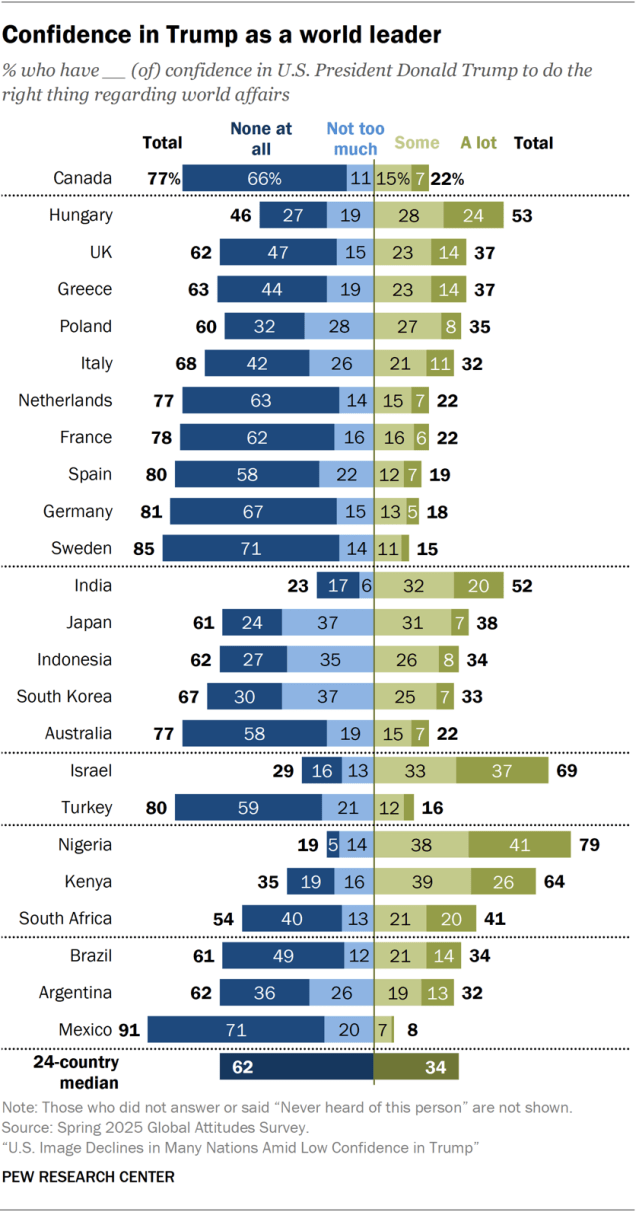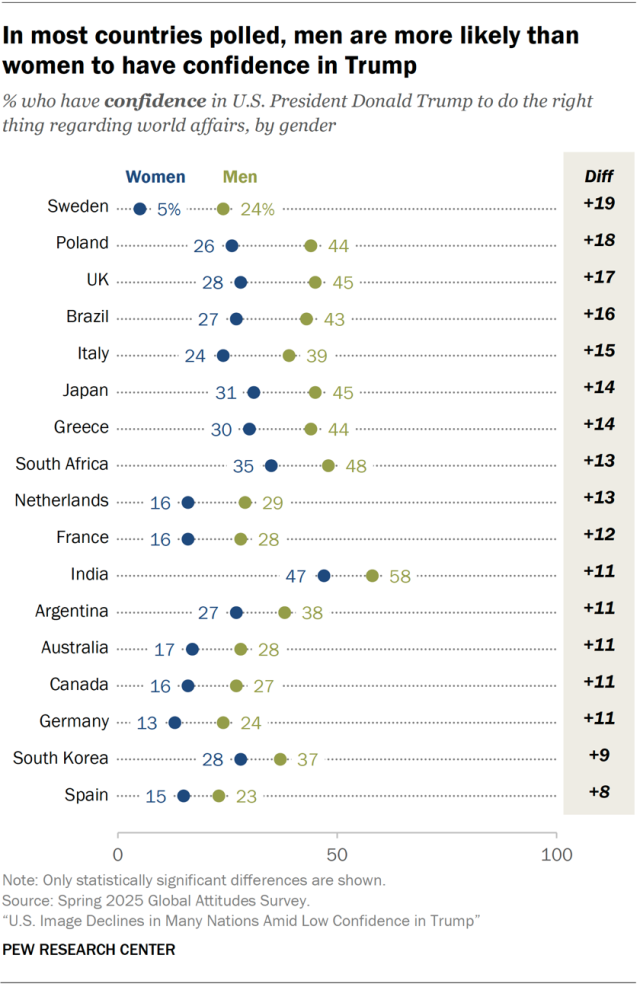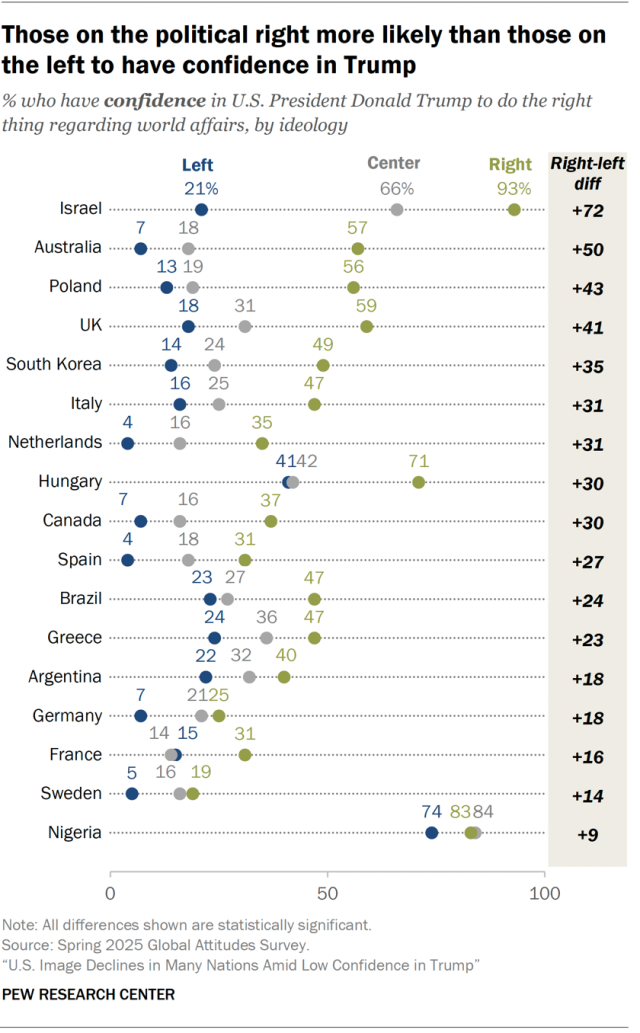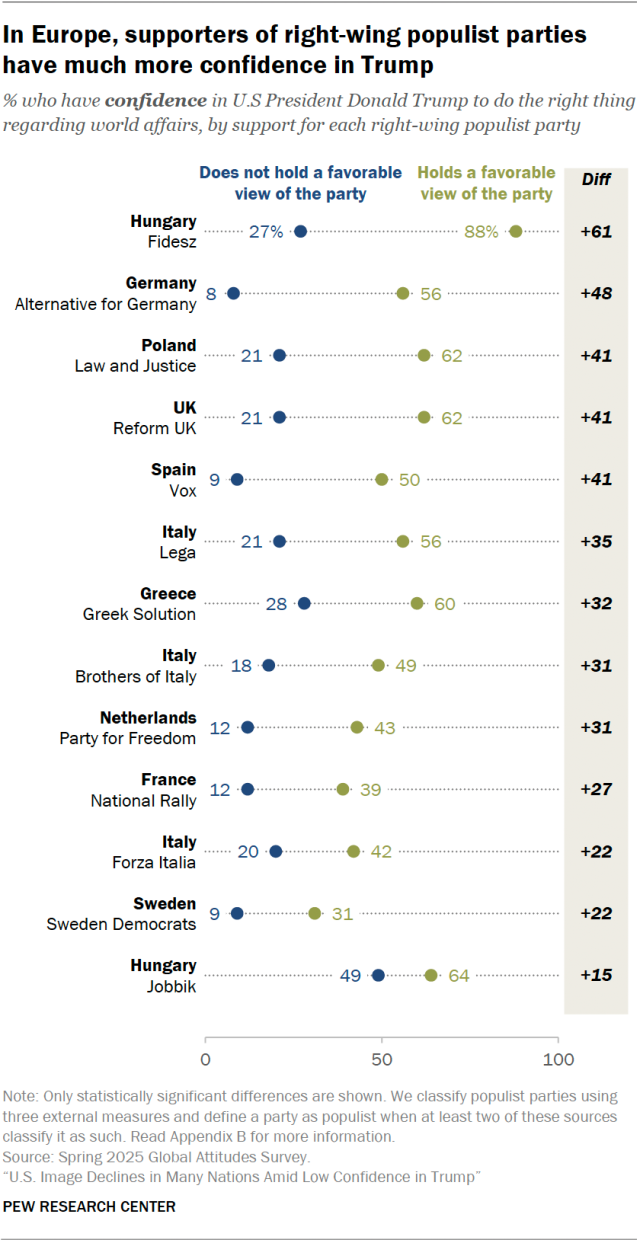Across 24 countries, a median of 34% of adults have a lot or some confidence in U.S. President Donald Trump to do the right thing regarding world affairs. Around six-in-ten (62%) have little or no confidence in Trump.
- Trump’s highest ratings come from Nigeria (79% confidence), Israel (69%), Kenya (64%), Hungary (53%) and India (52%).
- Trump’s lowest ratings come from Mexico (8% confidence), Sweden (15%), Turkey (16%), Germany (18%), and Spain (19%).
- In 17 countries, confidence in Trump is higher among men than women.
- Trump is seen more positively among those on the ideological right and among supporters of European right-wing populist parties.
- Ratings of Trump are lower than 2024 ratings of Biden in 13 nations but higher in six countries. And in most of the countries where trends are available, confidence in Trump is higher now than at the start of his first term in 2017.
Confidence in Trump

On balance, views of Trump are negative in 19 of the 24 countries surveyed.
Ratings of Trump are especially negative in Mexico (where 91% have little or no confidence in Trump’s ability to do the right thing regarding world affairs), Sweden (85%), Germany (81%), Spain (80%) and Turkey (80%).
Majorities in Australia, Canada, France, Germany, Mexico, the Netherlands, Spain, Sweden and Turkey have no confidence at all in Trump.
In contrast, confidence in Trump is higher in Nigeria (where 79% have some or a lot of confidence), Israel (69%), Kenya (64%), Hungary (53%) and India (52%). But in no country does a majority have a lot of confidence in the U.S. president.
Of the sub-Saharan African countries surveyed, confidence in Trump in South Africa is particularly low. (The survey was fielded there well before President Cyril Ramaphosa’s Oval Office meeting with Trump on May 21.)
Views by gender

In 17 countries, men are significantly more likely than women to have confidence in Trump.
For example, 44% of men in Poland have confidence in Trump to do the right thing regarding world affairs, compared with 26% of women. In India, Poland and South Africa, women are also less likely than men to share an opinion.
Views by age
In nine countries, older people (that is, those ages 50 and older) have less confidence in Trump than younger people (ages 18 to 34).
For example, 51% of younger Japanese have confidence in Trump compared with 31% of older Japanese. These age differences are also seen in Brazil, India, Poland, South Africa, Spain, Sweden, Turkey and the UK. In Brazil, South Africa and India, older adults are also less likely to provide a response.
Views by ideology

In virtually all countries where we asked about political ideology, those who place themselves on the right are more likely than those on the left to have confidence in Trump.
By far the biggest ideological difference is in Israel, where 93% of those on the right have confidence in Trump, compared with 21% on the left.
But substantial right-left differences are seen in many countries across all regions of the globe, including Australia, Canada, Hungary, Italy, Netherlands, Poland, South Korea and the UK.
The only exception to this pattern is found in Turkey, where those on the left are more confident in Trump than those on the right.
Views by right-wing party support

Similarly, people who support right-wing populist parties in Europe are much more likely than nonsupporters to have confidence in Trump.
Very large differences between supporters and nonsupporters are seen of Fidesz and Jobbik in Hungary; AfD in Germany; Law and Justice in Poland; Reform UK in the UK; Vox in Spain; Lega, Brothers of Italy and Forza Italia in Italy; Greek Solution in Greece; Party for Freedom in the Netherlands; National Rally in France; and the Sweden Democrats in Sweden.
Trump is seen more positively by supporters of right-wing parties in other regions, too, including supporters of Argentina President Javier Milei’s La Libertad Avanza, former Brazilian President Jair Bolsonaro’s Liberal Party, Israeli Prime Minister Benjamin Netanyahu’s Likud Party, and the People Power Party of former South Korean President Yoon Suk Yeol.
Views by religion and ethnicity
Among Israelis, there is a stark divide in views of Trump by ethnicity: 83% of Jewish Israelis have confidence in Trump, while 18% of Arab Israelis say the same. A majority of Arab Israelis have no confidence at all in Trump (58%), while 45% of Jewish Israelis have a lot of confidence in him.
Related: Israeli Public is Increasingly Skeptical About Lasting Peace
In India, 54% of Hindus have confidence in Trump, compared with 39% of Muslims.
Among Nigerians, similar shares of Christians (81%) and Muslims (74%) have confidence in Trump.
Comparing confidence in Trump and Biden

Attitudes toward Trump are generally low compared with assessments of his predecessor, President Joe Biden.
In 13 countries, confidence in Trump is down significantly from the ratings Biden received last year. The biggest drops are in Sweden (-48 points), Germany (-45), Poland (-40) and the Netherlands (-40).
Trump’s ratings are higher than Biden’s in Hungary (+24), Nigeria (+13), Israel (+12), Turkey (+8), India (+8) and South Africa (+5).
Since last year, there have also been shifts in the confidence ratings of the U.S. president by ideology.
In many countries, people on the ideological left give Trump far lower ratings this year than they gave Biden last year. For example, in the UK, 18% of those on the left express confidence in Trump, compared with 39% for Biden in 2024. In contrast, 59% of those on the right view Trump positively, compared with 33% for Biden last year.
Trump also fares much better this year than Biden did last year among supporters of right-wing populist parties in Europe, including supporters of Fidesz in Hungary (+69), Reform UK (+29), Greek Solution (+23), Lega in Italy (+19) and AfD in Germany (+18).
And among people with a favorable view of AfD, Fidesz and Reform UK, confidence in Trump is the highest it’s been during any of his years in office.
In some countries, views of the U.S. president have diverged along gender lines since last year, reflecting the gender gap we have previously observed in international attitudes toward Trump.
- In the UK, confidence among men grew from 35% for Biden in 2024 to 45% for Trump in 2025. Among women, confidence fell 17 points.
- In the Netherlands, confidence in the U.S. president is 30 points lower this year among men, but 48 points lower among women.
- Confidence among Swedish men fell from 59% for Biden to 24% for Trump, while confidence among women fell from 68% to 5%.
- In Canada, 59% of women had confidence in Biden and 16% have confidence in Trump. Confidence among men declined less, from 45% to 27%.
In most countries where we can trend from the start of Trump’s first term in 2017, confidence in him has improved. This includes big jumps in confidence among Nigerians (+21) and Brazilians (+20). Overall, there have been significant upward shifts in confidence ratings in 20 of the 22 countries where these trends are available, and none show significant declines in confidence ratings compared with eight years ago. In several countries, confidence in Trump has increased particularly among those on the ideological right since 2017.
Compared with our 2020 survey, when U.S. image was particularly low in part due to concerns about how the country was handling the COVID-19 pandemic, Trump’s confidence ratings are significantly higher in the UK (+18), Italy (+16), South Korea (+16), Japan (+13), France (+12), Germany (+8) and the Netherlands (+5).
Confidence in Trump is also up in 14 countries since he was a presidential candidate last year. (That survey was fielded before the attempted assassination of Trump in Pennsylvania and before Biden dropped out of the race and was replaced by Vice President Kamala Harris.)




